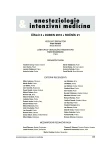N-terminal pro-Brain natriuretic peptide (NT-proBNP) in acute brain disease: Elevated serum levels without sodium imbalance
Authors:
Špatenková Věra 1; Kazda Antonín 2; Suchomel Petr 1
Authors‘ workplace:
Neurocentrum, Krajská nemocnice, Liberec
1; Ústavu klinické biochemie a laboratorní diagnostiky Všeobecné fakultní nemocnice a 1. lékařské fakulty Univerzity Karlovy, Praha
2
Published in:
Anest. intenziv. Med., 21, 2010, č. 3, s. 141-145
Category:
Intensive Care Medicine - Original Paper
Overview
Objective:
B-type natriuretic peptide is a member of the peptide family which increases urine and sodium output in the kidneys and causes vasodilatation in the vessels. In acute brain disease it is connected with hyponatraemia and natriuresis, forming the cerebral salt wasting syndrome (CSWS). The aim of this study was to evaluate serum NT-proBNP and its relationship to sodium and water metabolism parameters in patients with acute brain disease in the absence of CSWS.
Design:
Retrospective study.
Setting:
Neurological-neurosurgical intensive care unit, Regional Hospital.
Material and method:
We observed NT-proBNP values in 18 patients (9 women, 9 men, mean Glasgow Coma Scale 14 ± 1) with acute brain disease (subarachnoid haemorrhage 9, intracerebral haemorrhage 2, tumour 5, other 2) with normal renal parameters and New York Heart Association (NYHA) classification I. Serum sodium concentration and osmolality were measured on the day of taking the NT-proBNP sample (day 1) and 24 hours later (day 2), further parameters – urine output, urinary loss of sodium, fluid and sodium intake, were observed for a period of 24 hours after the NT-proBNP measurement.
Results:
Serum levels of NT - proBNP (mean 37.4 ± 29.5 pmol/l, 316.8 ± 250.3 pg/ml) were statistically significantly higher than the normal value (14.8 pmol/l, 125 pg/ml, p = 0.005), while no significant changes were observed in the levels between day 1 and 2 of either serum sodium (p = 0.799) or serum osmolality (p = 0.388). Furthermore, there was no proven significant correlation between NT-proBNP and the measured parameters.
Conclusion:
This study showed a significant elevation of NT-proBNP in patients with acute brain disease that was not accompanied by the development of CSWS.
Keywords:
B-type natriuretic peptide – NT-proBNP – hyponatraemia – cerebral salt wasting syndrome
Sources
1. Ruskoaho, H. et al. Mechanisms of mechanical load-induced atrial natriuretic peptide secretion: role of endothelin, nitric oxide, and angiotensin II. J. Mol. Med., 1997, 75, p. 876–885.
2. Hall, C. Essential biochemistry and physiology of (NT - -pro)BNP. Eur. J. Heart Fail, 2004, 6, p. 257–260.
3. Vanderheyden, M. et al. Brain and other natriuretic peptides: molecular aspects. Eur. J. Heart Fail., 2004, 6, p. 261–268.
4. de Bold, A. J. et al. A rapid and potent natriuretic response to intravenous injection of atrial myocardial extract in rats. Life Sci., 1981, 28, p. 89–94.
5. Sudoh, T. et al. A new natriuretic peptide in porcine brain. Nature, 1988, 332, p. 78–81.
6. Kazda, A. et al. Akutní onemocnění mozku – poruchy vodního a natriového hospodářství, natriuretické peptidy. Klin. Biochem. Metab., 2003, 11, s. 74–82.
7. Strohle, A. et al. Anxiolytic activity of atrial natriuretic peptide in patients with panic disorder. Am. J. Psychiatry, 2001, 158, p. 1514–1516.
8. Hobbs, F. D. et al. The diagnosis of heart failure in European primary care: The Improvement Programme survey of perception and practice. Eur. J. Heart Fail., 2005, 7, p. 768–779.
9. Kirk, V. et al. N-terminal proBNP and mortality in hospitalised patients with heart failure and preserved vs. reduced systolic function: data from the prospective Copenhagen Hospital Heart Failure Study (CHHF). Eur. J. Heart. Fail., 2004, 6, p. 335–341.
10. Wijdicks, E. F. et al. Atrial natriuretic factor and salt wasting after aneurysmal subarachnoid hemorrhage. Stroke, 1991, 22, p. 1519–1524.
11. Berendes, E. et al. Secretion of brain natriuretic peptide in patients with aneurysmal subarachnoid haemorrhage. Lancet, 1997, 349, p. 245–249.
12. Sviri, G. E. et al. Brain natriuretic peptide and cerebral vasospasm in subarachnoid hemorrhage: Clinical and TCD correlations. Stroke, 2000, 31, p. 118–122.
13. McGirt, M. J. et al. Correlation of serum brain natriuretic peptide with hyponatremia and delayed ischemic neurological deficits after subarachnoid hemorrhage. Neurosurgery, 2004, 54, p. 1369–1373.
14. Sviri, G. E. et al. Alteration in brain natriuretic peptide (BNP) plasma concentration following severe traumatic brain injury. Acta Neurochir., 2006, 148, p. 529–533.
15. Jensen, J. K. et al. N-terminal pro-brain natriuretic peptide after acute ischemic stroke. Cerebrovasc. Dis., 2006, 22, p. 439–444.
Labels
Anaesthesiology, Resuscitation and Inten Intensive Care MedicineArticle was published in
Anaesthesiology and Intensive Care Medicine

2010 Issue 3
-
All articles in this issue
- Sugammadex (Bridion®) – our first experience with the reversal of moderate rocuronium-induced neuromuscular block
- Xenon inhalational anaesthesia in volunteers
- N-terminal pro-Brain natriuretic peptide (NT-proBNP) in acute brain disease: Elevated serum levels without sodium imbalance
- Acute kidney injury in critically ill patients – update 2009
- Renal replacement therapy (RRT) in critically ill patients – update 2009
- Multiple organ dysfunction syndrome (MODS) – from molecules to the bedside
- Anaesthesiology and Intensive Care Medicine
- Journal archive
- Current issue
- About the journal
Most read in this issue
- Multiple organ dysfunction syndrome (MODS) – from molecules to the bedside
- Xenon inhalational anaesthesia in volunteers
- Sugammadex (Bridion®) – our first experience with the reversal of moderate rocuronium-induced neuromuscular block
- N-terminal pro-Brain natriuretic peptide (NT-proBNP) in acute brain disease: Elevated serum levels without sodium imbalance
